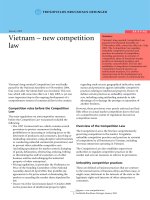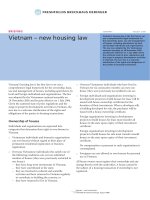Vietnam - new housing law
Bạn đang xem bản rút gọn của tài liệu. Xem và tải ngay bản đầy đủ của tài liệu tại đây (63.6 KB, 2 trang )
1
Vietnam – new housing law
Freshfields Bruckhaus Deringer, August 2006
Vietnam’s housing law is the first law to set out a
comprehensive legal framework for the ownership, lease,
use and management of houses, including apartments, by
local and foreign individuals and organisations. The law
was adopted by the Vietnamese national assembly on
29 November 2005 and became effective on 1 July 2006.
Given the scattered state of prior regulations and the
surge in property development activities in Vietnam, the
new law is a welcome clarification of the rights and
obligations of the parties to housing transactions.
Ownership of houses
Individuals and organisations are separated into
categories that determine their right to own houses in
Vietnam.
Vietnamese individuals and domestic organisations
can own houses without regard to their place of
permanent residential registration or business
registration.
Overseas Vietnamese individuals who satisfy one of
the following conditions can own an unlimited
number of houses (they were previously restricted to
one house):
– they have long-term investments in Vietnam;
– they have contributed to the state;
– they are involved in cultural and scientific
activities and have returned to Vietnam regularly
to contribute to building the country; or
– they have returned to live in Vietnam.
Overseas Vietnamese individuals who have lived in
Vietnam for six consecutive months can own one
house (they were previously not entitled to do so).
Foreign individuals and organisations investing in
development projects to build houses for lease will be
issued with house ownership certificates for the
duration of their investments. When a developer sells
a building developed for sale, the purchaser will be
issued with a house ownership certificate.
Foreign organisations investing in development
projects to build houses for lease must transfer all
houses to the state upon expiry of their investment
certificate.
Foreign organisations investing in development
projects to build houses for sale must transfer unsold
houses to the state upon expiry of their investment
certificate.
No compensation or payment to such organisations is
contemplated.
Foreigners are not allowed to own houses for personal
use in Vietnam.
All house owners must register their ownership and any
change therein with the authorities. A house cannot be
the subject of a housing transaction if ownership is not
registered.
Vietnam – new housing law
Vietnam’s housing law is the first law to set
out a comprehensive legal framework for
the ownership, lease, use and management
of houses, including apartments, by local
and foreign individuals and organisations.
The law was adopted by the Vietnamese
national assembly on 29 November 2005
and became effective on 1 July 2006. Given
the scattered state of prior regulations and
the surge in property development activities
in Vietnam, the new law is a welcome
clarification of the rights and obligations of
the parties to housing transactions.
BRIEFING
SUMMARY AUGUST 2006
2
Vietnam – new housing law
Freshfields Bruckhaus Deringer, August 2006
The housing law provides that companies providing
management services to apartment buildings are entitled
to be treated in the same way as utilities companies,
without specifying what such treatment may entail. This
issue may be clarified in the implementing regulations.
Leasing of houses
The rights of foreign organisations and individuals to
lease houses have not changed substantially from
previous regulations. To lease houses:
– foreign individuals must have a valid visa to be in
Vietnam for three months or longer; and
– organisations must have the right to be in Vietnam
for three months or longer,
but overseas Vietnamese are not required to stay in
Vietnam for any minimum period.
A lessee has the right to continue leasing the house
when the owner of the house dies, and when the
house is transferred to another owner. In both cases,
the successor in title to the house has to continue to
allow the lessee to lease the house, unless the parties
agree otherwise.
Mortgaging of houses
A house owner has the right to mortgage the house as
security for one or several obligations if the value of
the house is higher than the total value of all
obligations. However, mortgages can be granted only
to one single credit institution. The housing law is the
first piece of legislation to introduce this restriction,
probably to ease the difficulties in enforcement of
mortgages in practice.
House owners can mortgage their houses only to
credit institutions permitted to operate in Vietnam.
Housing development projects
Construction requirement
The housing law sets out some construction
requirements for housing development projects.
Apartments must account for the following percentages
of total construction area:
in special urban areas, at least 60 per cent;
in class 1 and class 2 urban areas, at least 40 per cent;
and
in class 3 urban areas, at least 20 per cent.
Funding
The housing law allows the developer to accept up to
70 per cent of the value of the house lease or house
purchase contract from a potential purchaser or lessee,
provided that the foundations for the house have been
completed.
Social welfare housing
The housing law sets out the legal framework for a social
welfare housing fund in Vietnam for lease and hire
purchase to Vietnamese families. It also stipulates that
housing developers for low-income households will
receive special incentives such as land rental exemptions
and lower tax rates.
Warranties
Developers of residential buildings of nine floors or more
must provide a warranty for a minimum period of
60 months. The minimum warranty period is reduced to
36 months for buildings from four to eight floors, and to
24 months for other residential premises. These warranty
periods are substantially higher than the 12 month
warranty requirement set out in the recent decree 2 dated
5 January 2006 on management of new urban areas.
Management of apartment buildings
The housing law consolidates legal regulations on the
management of apartment buildings. It clarifies the
rights and obligations of apartment owners and users,
including in the management of private and public areas
(the housing law defines private and public areas for this
purpose).
15848
This material is for general information only and is not intended to provide
legal advice.
©
Freshfields Bruckhaus Deringer 2006
www.freshfields.com
For further information please contact Tony Foster
T+
84 4 8247 422
F+
84 4 8268 300
E
tony.foster
@
freshfields.com









